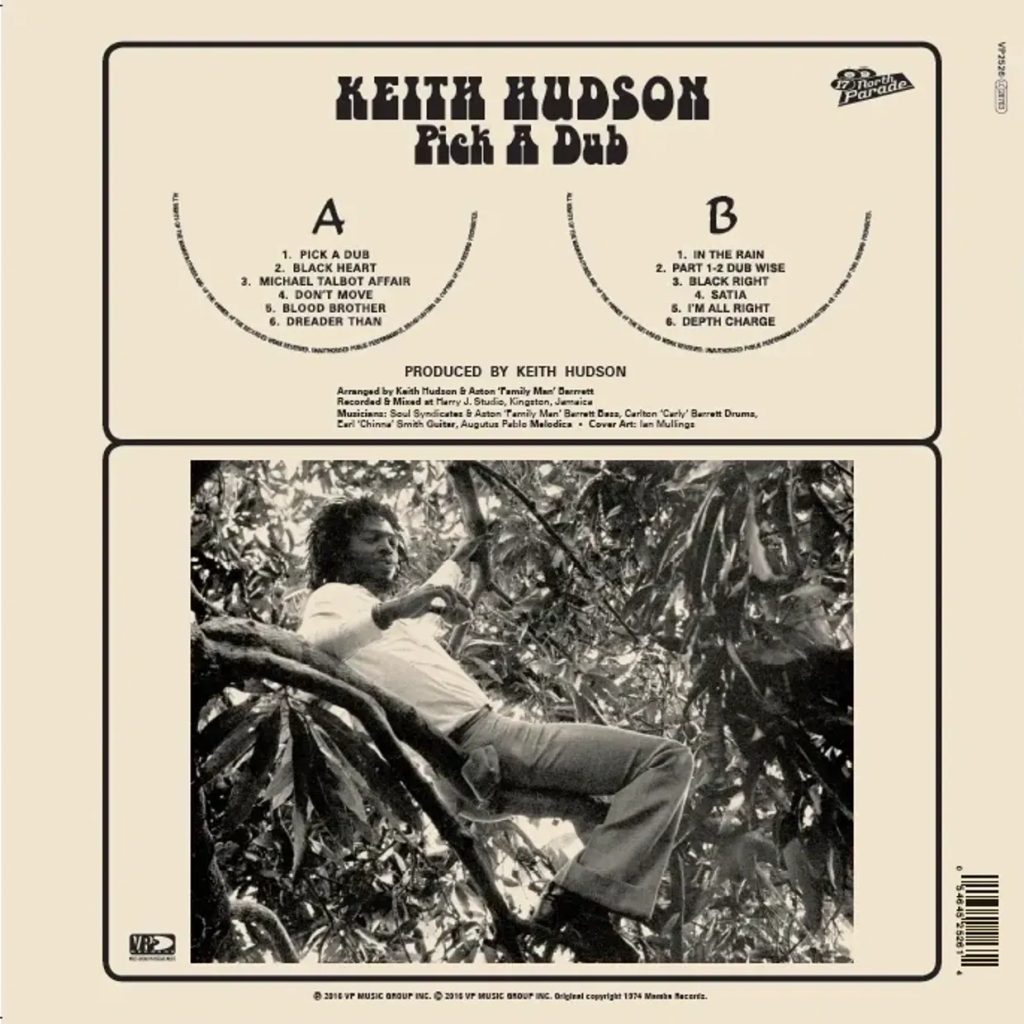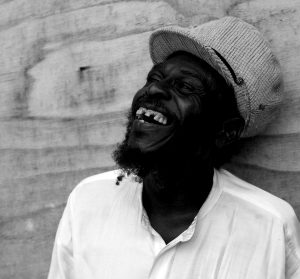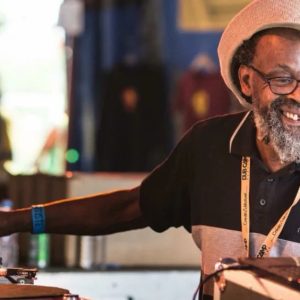Keith Hudson was a Jamaican reggae artist and record producer.
He is known for his influence on the dub movement.
Raised in a musical family, Hudson attended Boys Town School in Kingston, where he organized school concerts with schoolmates including Bob Marley, Delroy Wilson, and Ken Boothe. He was an ardent follower of Coxsone Dodd‘s Downbeat sound system and was soon hanging out with musicians such as Don Drummond, carrying his trombone into sessions at Dodd’s Brentford Road studio when he was around fourteen. His first release circa 1969 was “Shades of Hudson” by DJ Dennis Alcapone on his own Inbidimts label, using a rocksteady track that had been recorded a few years before. After leaving school he served an apprenticeship in dentistry, and used these skills to raise money for recording sessions.In the same year he obtained some Termites and Carl Bryan rocksteady rhythms from Olympic Records, and recorded new vocals over them, such as “Old Broom” and “You Must be Popular”. These early 45s on his own Imbidmts and Rebind labels enjoyed sufficient success to enable him to purchase some studio time of his own. His first recording session produced Ken Boothe‘s Jamaican hit “Old Fashioned Way”, later versioned by Dennis Alcapone as “Spanish Omega” and U Roy as “Dynamic Fashion Way”. In the following months he worked with vocalists Delroy Wilson (“Run, Run”), Alton Ellis, Bunny Gale and John Holt (“Never Will I Hurt My Baby”). He was one of the first to record DJ U-Roy in 1969, although U-Roy’s first recording had in fact been made with Peter Tosh for Lee Perry – “Earth’s Rightful Ruler”. Other deejay productions included numerous tunes with Dennis Alcapone (e.g. “Shades of Hudson”), and Big Youth‘s “S.90 Skank” released in 1972 became the deejay’s biggest hit, with added motorcycle noises recorded in the studio beginning a trend followed by other producers such as Dodd and Perry.In the first half of the 1970s he regularly used the Soul Syndicate band, featuring George “Fully” Fullwood and Carlton “Santa” Davis.
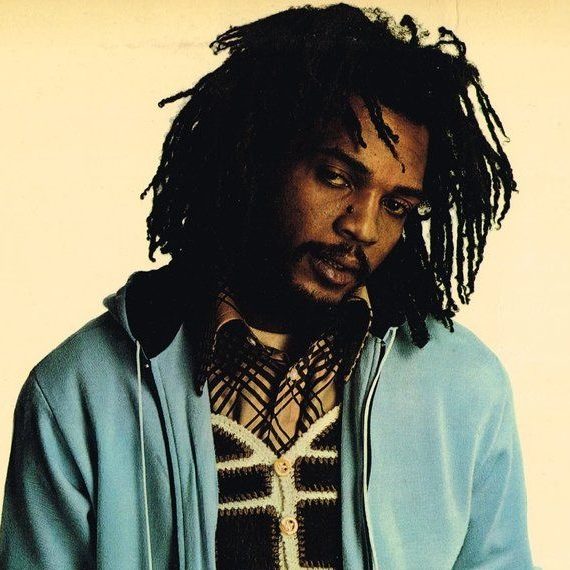
In 1970 he began to record his own vocal tracks.Whilst always somewhat limited vocally, he recorded countless tracks as a singer, and concentrated on his singing career from 1972. He started further record labels such as the Mafia label. His early Jamaican albums Furnace and Class and Subject featured his own distinctive rasping vocals, along with dubs and deejay versions. In 1974, Hudson released his classic Pick a Dub, widely considered to have been the first deliberately thematic dub album, with tracks specifically mixed in the dub style for the purpose of appearing together on an album. It featured dubwise mixes of his “We Will Work It Out”, the basic track for “S-90 Skank”, with a fresh melodica part by Augustus Pablo, Skiddy and Detroit’s “The Exile Song”, and remakes of The Abyssinians “Satta Massagana” and “Declaration of Rights”. It was also the first dub album to gain a release in the United Kingdom.
By now, he had effectively stopped recording other singers and DJs to concentrate on his own singing. He had completed a large number of backing tracks and, after the limited success of his third LP Entering the Dragon he emigrated to the United Kingdom, where he signed up with Brent Clarke’s Atra label and worked at Chalk Farm Studios in London with a number of British-based reggae musicians, overdubbing his Jamaican rhythms. The first album to emanate from these sessions was Flesh of My Skin, Blood of my Blood (1974), his first UK only release and an album that has been described by Colin Larkin as “a masterpiece”, and one of the first reggae albums proper, rather than merely a collection of singles and fillers. It has also been described as “reggae’s first true concept album”, with the lyrics relating to black history and “conscious” themes. The album was not released in Jamaica, although it acquired a formidable reputation there amongst more progressive musicians. His next UK-based album Torch of Freedom featured vocal cuts with their instrumental versions following immediately after, a format that was to come into fashion three years later during the “Showcase” craze.
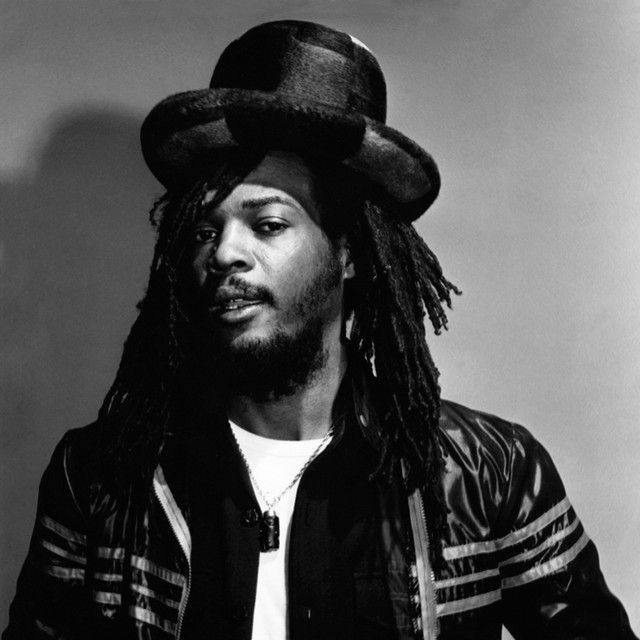
In 1976 he moved to New York City and signed a four-year contract with Virgin Records, the first release being the soul-influenced album, Too Expensive, which was poorly received by critics and didn’t sell well.Hudson returned to reggae with the “(Jonah) Come Out Now” single, released under the pseudonym Lloyd Linberg, and Virgin terminated his contract.Hudson then started a new label of his own, Joint.He resumed working with the Soul Syndicate, who had backed him on many of his best recordings in Jamaica. His album Rasta Communication (1978), which had been preceded by its issue on dub as Brand, was well received by a wider audience and is considered a roots reggae classic. It was followed by Nuh Skin Up Dub and its vocal counterpart From One Extreme to Another in 1979. Hudson also released a deejay album by Militant Barry based on the Brand rhythms, Green Valley.By the early 1980s, he was considerably out of step with modern trends in “dancehall” music. He reverted to his classic rhythms for his next to last album Playing It Cool (1981), recording new vocals on heavily overdubbed mixes of the earlier tunes. He released one final album in 1982, Steaming Jungle, which attracted little attention. It was reported in 1984 that he was once more working with Aston and Carlton Barrett, who had played on Pick a Dub and Torch of Freedom. Hudson was diagnosed with lung cancer in August 1984, and appeared to be responding well to treatment, but on the morning of 14 November he complained of stomach pains, collapsed and died.
Pick a Dub
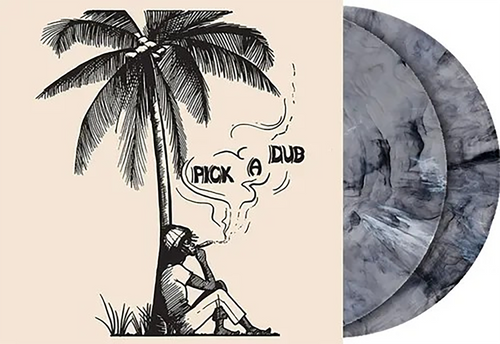
Pick a Dub is a 1974 album by Jamaican producer and musician Keith Hudson. Critically well received, it is widely regarded as an important work in the dub music genre which evolved out of reggae. Featuring remixes of earlier material, it focuses on heavy drums and bass guitar, with echoing vocals to underscore the intense percussive rhythm. Carlton and Aston Barrett and Augustus Pablo contributed music, while vocal fragments include Hudson, Horace Andy and Big Youth. The album was originally released under the labels of Mamba and Atra, with a 1994 reissue by Blood and Fire.
The album has been critically well received and is regarded as important in Hudson’s discography and in the genre of dub music. In 1994, The Wire identified the album as “one of the first dub albums” and described it as a “must-have”.Lloyd Bradley, author of This is Reggae Music, suggests that along with King Tubby Meets Rockers Uptown, Super Ape and African Dub Chapter Three this album is “one of the supreme heavyweight champion dub sets.” Including the album in its 2007 comprehensive series on “1000 Albums to Hear Before You Die”, The Guardian indicated that “no other dub album can rival Pick-a-Dub’s austere sonic qualities.”In England’s Dreaming, Jon Savage gives the album his “vote for the greatest dub album ever.”Allmusic in its review characterized the album as “a seminal work, a landmark in progressive remixing” that is “arguably the crowning achievement of Hudson’s career.”While arguing by contrast for Hudson’s later album Brand, the website brainwashed indicates that Pick a Dub typically “ranks as the pinnacle of his dub releases”.
Music
Pick a Dub consisted of remixes, specifically primarily instrumental “riddim” dubs, of earlier material. Though reworked and retitled, Hudson’s track list recast earlier songs into new form. The classics “Declaration of Rights” and “Satta Massagana” were recut as “Black Right” and “Satia”. The title track, “Pick a Dub”, was a dub of Hudson’s own composition “S.90 Skank”, which had been a hit song for Big Youth. The album focused on the heavy rhythms of bass guitar and drums, with snippets of otherworldly vocals. The Wire identified as among the album’s strengths “[s]tuttering melodica, squelching keyboard and guitar chops and a mix which dropped instruments in and out of the sound picture every few bars”. Hudson did not use the processed sound effects that later became common in the movement, a lack cited as “refreshing” by Bradley, who noted that such early sets reflected “the remixer’s art in its purest form”.The overall effect of Hudson’s music is described by brainwashed as “uniquely deep and gothic”
History
The album was recorded with Carlton and Aston Barrett of Bob Marley & The Wailers on drums and bass, with additional music supplied by melodica virtuoso Augustus Pablo. Snippets of vocal tracks included material by Hudson, Horace Andy and Big Youth. It was originally released in 1974 on the Mamba label prior to release by Atra. In 1994, it was reissued by Blood and Fire.
Pick A Dub – Keith Hudson & Family Man (Deluxe Edition)
Liner Notes by Noel Hawks
https://keithhudsonmusic.com/pick-a-dub
Invariably cited as one of the best dub albums ever made, ‘Pick A Dub’, was originally released in 1975 on the Mamba label in Kingston and then in London in a plain, understated black & white sleeve. It was subsequently taken up by Brent Clarke’s UK based Atra label which used the same cover illustration only coloured in for this release and, with the benefit of Virgin Records distribution network, the set reached a far wider audience. The album was in and out of press over the next twenty years before being given the accolade of becoming the third record to be released on Steve Barrow’s prestigious Blood and Fire label in 1994.
The enigmatic Keith Hudson will be forever remembered as a true musical originator who eschewed easy solutions and who always pursued his own highly individual path. His work was inspirational to the direction that reggae would take during the seventies and presaged the arrival and acceptance of the time when deejays, dub and dread lyricism became the order of the day.
“Keith Hudson is a man who used to do his own thing… and he used to look after his own things” Prince Jahkey
His first seven inch release on his Inbidimts label, Ken Boothe’s ‘Old Fashioned Way’… “that’s the record that really launched him”, was a big hit in 1969 but Keith would soon come to the realisation that his artistic vision could not be contained within the strictures of a seven inch single. He released his first thematic album, ‘Furnace’, in 1972 followed in 1973 by ‘Strength To Strength’ (released in the UK as ‘Entering The Dragon’ two years later) and then ‘Class And Subject’. All three long players were only ever pressed in very small quantities, did not sell particularly well, and are now seriously sought after, highly priced rarities.
“I like albums. So many singles come out you can have one out and it get lost ‘mongst records y’know…” Keith Hudson
At the outset of his career he demonstrated that were more ways to make use of a rhythm than sing over it and “the great producer K. Hudson” was one of the very first to realise the importance of deejays. These unsung masters of the microphone had kept things running hot in Jamaica’s dance halls since the very early days of sound systems but, on the rare occasions when they made records, they were usually not credited.
In 1969 Ewart ‘U Roy’ Beckford was deejaying for Dickie Wong’s Dickie’s Dynamic sound system when Keith took him to the studio to record ‘Dynamic Fashion Way’ over the ‘Old Fashioned Way’ rhythm with an altered bass line but “although it got in the charts it wasn’t really a big seller”. The following year Keith Hudson went looking for Dennis AlCapone, the deejay for El Paso sound system, and asked him to make his first record. Many years later, Dennis recalled how revolutionary this move had been:
“‘So what do you do? Did you sing?’
No.
‘Did you play an instrument?’
No
‘So what did you do?’
Well… I kinda talk.
‘Man can talk ‘pon record? Heh, heh, heh…’
Well we call it deejay… you know I deejayed the record… it’s a form of talk.
And he laughed after me.
You’re a singer or you play instruments… you can’t talk ‘pon a record!”
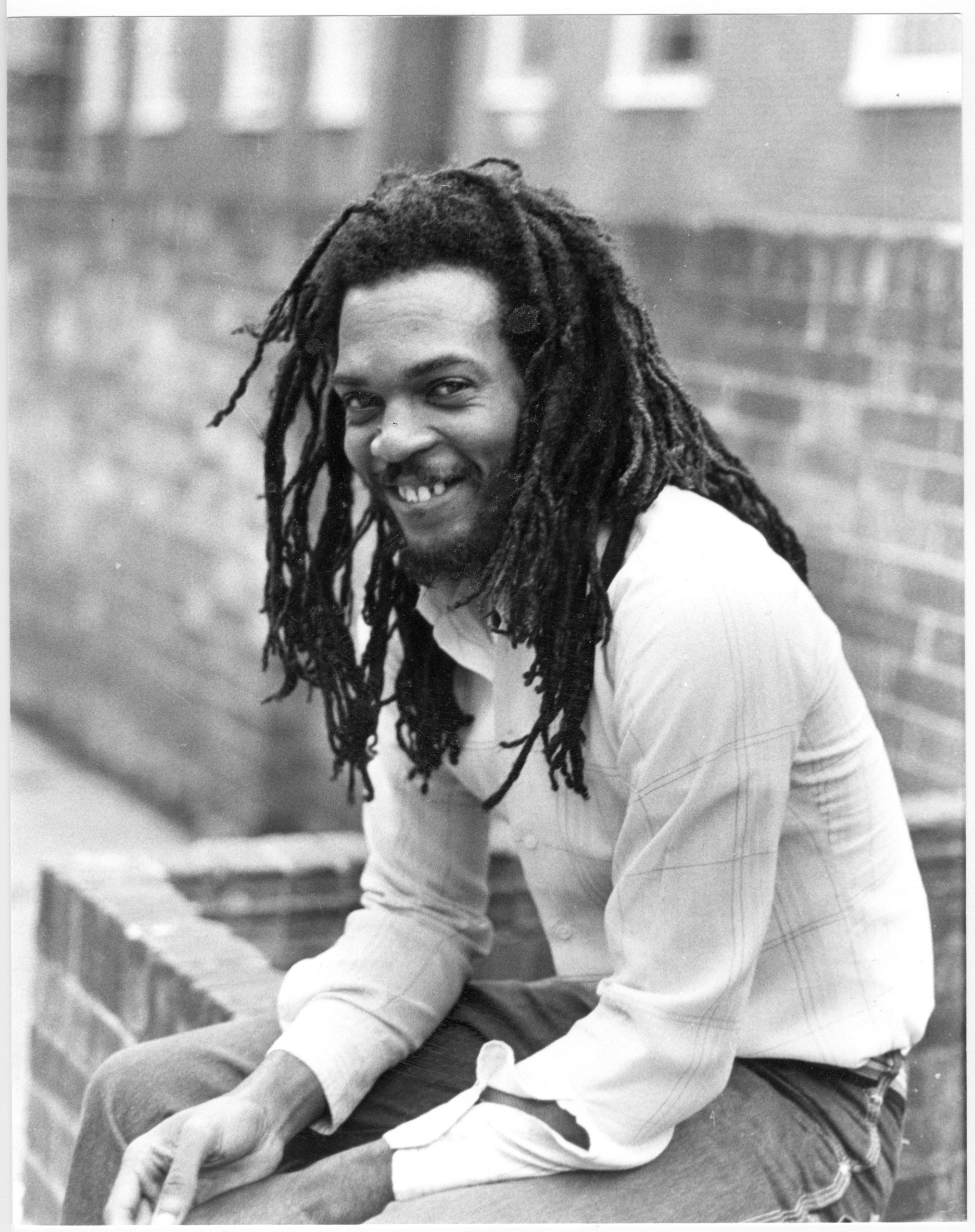
They made a number of records together before Dennis departed for Studio One and before Keith escorted Big Youth, Ossie Hibbert, a motorcycle and the tape of a rhythm that Keith had previously sung as ‘We Will Make It Up’ to Dynamic Sounds Recording Studios in 1972. The resulting ‘S. 90 Skank’, also known as ’Ace 90 Skank’, was released on Keith’s Mafia label and remained at the top of the Jamaican charts for four months. The importance of these releases to the advancement of talking records is inestimable.
“It was all about deejay music. We started this revolution from about 1969 coming on and rap music started in the eighties with people who migrated to the USA and took all these deejay records with them… people heard them and like the idea… and that’s how rap started. Different rhythms… different way of talking.” Dennis AlCapone
But despite being a master of building rhythms, a leader in capturing the moment when it came to deejays and helping to create a brand new, now universally acclaimed, art form the ever restless Keith Hudson chose to press forward again. He relocated to London in 1974 where he put together his first flawless masterwork, ‘the black breast has produced her best, flesh of my skin blood of my blood’ better known as ‘Flesh Of My Skin’, at Chalk Farm Studios under the supervision of Neil Richmond. Released on his Mamba label in November 1974 the album was an overwhelming critical success but was only available in a few favoured specialist record shops where the LP sold as a ‘pre-release’ at more than two and three times the current price of a ‘released’ album. I remember paying £5.00 for my copy in the excellent Slipped Disc record shop in Battersea, South West London in 1975.
“All in all a really splendid album (much better than I expected actually!) and even worth the £3.50 you have to lash out for it.” Chris Lane
The ‘Torch Of Freedom’ album, originally issued on Mamba in June 1975 and later picked up, remixed and repackaged by Atra with the benefit of a Virgin distribution deal, was followed by one of the few near perfect dub albums. ‘Pick A Dub’ showcased the enduring strength and pivotal importance of the rhythm to the development of reggae music and Keith Hudson’s complete mastery of the genre. “It focuses on heavy drums and bass guitar, with echoing vocals to underscore the intense percussive rhythm…” and the unqualified praise that followed its release was fully justified.
“Keith Hudson was a very humble bredda… he was a gentle giant. He can build a rhythm in minutes… quick, fast. The musicians don’t mess around on a session with Keith!”
Prince Jahkey
The title track, ‘Pick A Dub’, was first recorded by Keith as ‘We Will Make It Up’ and eventually released with deejay accompaniment by Philip Samuel after the rhythm became a monster hit for Big Youth’s epochal ‘Ace 90 Skank’/’S90 Skank’ outing. The rhythm was later enhanced by Augustus Pablo’s melodica version, ‘Fat Baby’, and Zap Pow’s horns outing, ‘Broken Contract’, and both the Big Youth and Augustus Pablo versions feature prominently in this monumental mix.
‘Black Heart’ was originally used by Keith Hudson for two vocal outings ‘Fight On, Fight On’, featured on this release, and ‘True To My Heart’ both released on his Mafia label in Jamaica.
One of Jamaica’s best ever singers, Delroy Wilson, interpreted the American folk blues standard ‘House Of The Rising Sun’ for Keith as ‘Place In Africa, also known as ‘Addis Ababa’, with heavy rock/fuzz guitar overdubs. The origins of this song are lost in the mists of time although the version by Bob Dylan on his debut album in 1962 allegedly prompted The Animals to record their groundbreaking ‘folk rock’ outing two years later which was a worldwide hit for the group. Delroy’s haunting, unforgettable performance is a tour de force of Rastafarian rooted music. It was also covered by Skiddy & Detroit as ‘The Exile Song’ on a Mafia seven inch release before its eventual deconstruction here as ‘Michael Talbot Affair’.
The roots of ‘Don’t Move’ can be found in a previously unreleased Keith Hudson vocal track, ‘Be Still’, a version of a song originally recorded in 1962 by Derrick Morgan for Leslie Kong’s Beverley’s label in answer to Prince Buster’s ‘Blackhead Chinaman’. It is showcased here for the first time courtesy of Keith Hudson’s biographer and discographer, Vincent Ellis, on behalf of the Hudson Estate.
There is no known vocal counterpart to ‘Blood Brother’ a beautiful rhythm with a repeated horn refrain and some excellent guitar work.
The sprightly ‘Dreader Than’ was used a number of times by Keith starting out as ‘Wild Fire’ on a Mafia seven inch in 1974 and then ‘Shoulder To Shoulder’ released on Dynamic’s Weed Beat subsidiary two years later. Keith also sang it over as the reflective ‘Five More Minutes Of Your Time’ one of the standout tracks on the ‘Torch Of Freedom’ album.
Followed by two cuts of ‘In The Rain’ first recorded by The Dramatics for Memphis based Stax Records’ Volt label in 1972 which sold a million copies. The stormy sound effects on the USA version are replaced by a sparse drum and bass mix on the Jamaican interpretation and both are equally effective. The two different mixes showcased here are excellent examples of the varied results that a visionary on the board can achieve by using the console as an instrument in its own right.
‘Black Right’ and ‘Satta’ were recorded specifically for the ‘Pick A Dub’ album due to their perennial popularity on Kingston’s sound systems. Both were originally sung by The Abyssinians, one of the greatest Jamaican vocal groups ever, at Studio One on Brentford Road in 1969 but ‘Declaration Of Rights’ was a Studio One production and ‘Satta Amasa Gana’ was produced by The Abyssinians for their own Clinch label. ‘Satta Amasa Gana’, which means “give thanks” in Amharic, is one of the most versioned and influential songs in the history of reggae.
‘I’m Alright’, one of Horace Andy’s best ever records, and he’s made more great records than any number of singers, was first released as ‘Don’t Think About Me’ on Mafia in 1973. Keith Hudson returned to the rhythm for his own brooding ‘Melody Maker’… “all the way from Jamaica comes the melody maker” and a vocal cut ‘War War’ for the ‘Entering The Dragon’ album. Dino Perkins’ ‘Skin Him Alive’, Big Youth’s ‘Can You Keep A Secret?’ and Jah Whoosh’s ‘I’m Alright’ all also rode this classic rhythm.
The origins of ‘Depth Charge’ lie in ‘Still Water (Love)’ written and produced by Motown legends, Smokey Robinson and Frank Wilson, and a huge hit for The Four Tops in 1970 on both sides of the Atlantic. The vocal on this set is a previously unreleased version, again courtesy of Vincent Ellis on behalf of the Hudson Estate, initially recorded for an unreleased Keith Hudson album project.
“He focused on these soulful tunes… partly to showcase Keith’s handling of Motown and Stax material in an unrealised bid, however improbable, to attract interest from an American soul label.” Vincent Ellis
A subtle re-working of ‘Still Water’ eventually appeared as an early UK released twelve inch disco mix on Tunde Records in 1977.
There are many spurious claims that ‘Pick A Dub’ was the first dub album but these are untrue. They are also unnecessary because, quite simply, it stands on its own merits as one of the greatest dub long players ever put together. The album’s “austere sonic qualities” are awe inspiring, the superb rhythms are given full rein unencumbered by extra effects and studio trickery, and the overall effect is as mesmerising now as it was over forty years ago.
Its success propelled Keith Hudson to the forefront of reggae at a time when the music was never more “popular or profitable” and he was signed to an eight album contract by Virgin Records in January 1976. The first release was the aptly titled funk driven ‘Too Expensive’ album, a critical and commercial failure, and Keith was “promptly dropped by Virgin”. He moved on again and began work in New York on the magnificent ‘Brand’ and its vocal counterpart ‘Rasta Communication’ two faultless albums that would further consolidate Keith Hudson’s legacy as a radical visionary and originator of music of consummate creativity.
References:
Interview with Dennis AlCapone London, UK 9th November 2015
Interview with Ossie Hibbert London UK/New York, USA 11th January 2010
Interviews with David ‘Prince Jahkey’ Mohammed (Jamaica’s Musical Encyclopaedia)
London, UK 6th & 7th June 2016
Carl Gayle: ‘Blood Brother’ Black Music Volume 2 Issue 15 February 1975
Carl Gayle: ‘Rasta Country’ Black Music Volume 4 Issue 38 January 1977
Chris Lane: ‘All The Way from Jamaica Comes The Melody Maker’
Blues & Soul No. 108 April 1973
Chris Lane: Big Youth Blues & Soul No. 132 April 1974
Chris Lane: Skanking… Blues & Soul No. 148 November 1974
Steve Barrow & Dennis AlCapone: Liner Notes ‘Pick A Dub’ Blood & Fire BAFCD003 1994
Vincent Ellis: Liner Notes Keith Hudson ‘Tuff Gong Encounter’ VP VPCD2527 2015
Vincent Ellis & Jean Scrivener: Keith Hudson An Illustrated Discography 2014
Respect & Gratitude to: Vincent Ellis for his assistance and attention to detail.
With thanks to: Roy Cousins, Jabula Hudson, Ricardo Hudson,
David ‘Prince Jahkey’ Mohammed & Chris O’Brien
Musicians include:
Drums: Carlton ‘Carlie’ Barrett
Bass: Aston ‘Family Man’ Barrett
Melodica: Augustus Pablo
The Soul Syndicate:
Drums: Carlton ‘Santa’ Davis
Bass: George ‘Fully’ Fullwood
Rhythm Guitar: Albert Valentine ‘Tony’ Chin
Lead Guitar: Albert Valentine ‘Tony’ Chin & Earl ‘Chinna’ Smith
Keyboards: George ‘Fully’ Fullwood, Bernard ‘Touter’ Harvey & Keith Sterling
Recorded & Mixed at: Harry J Recording Studio, 10 Roosevelt Avenue, Kingston 6
Engineer: Sylvan Morris
